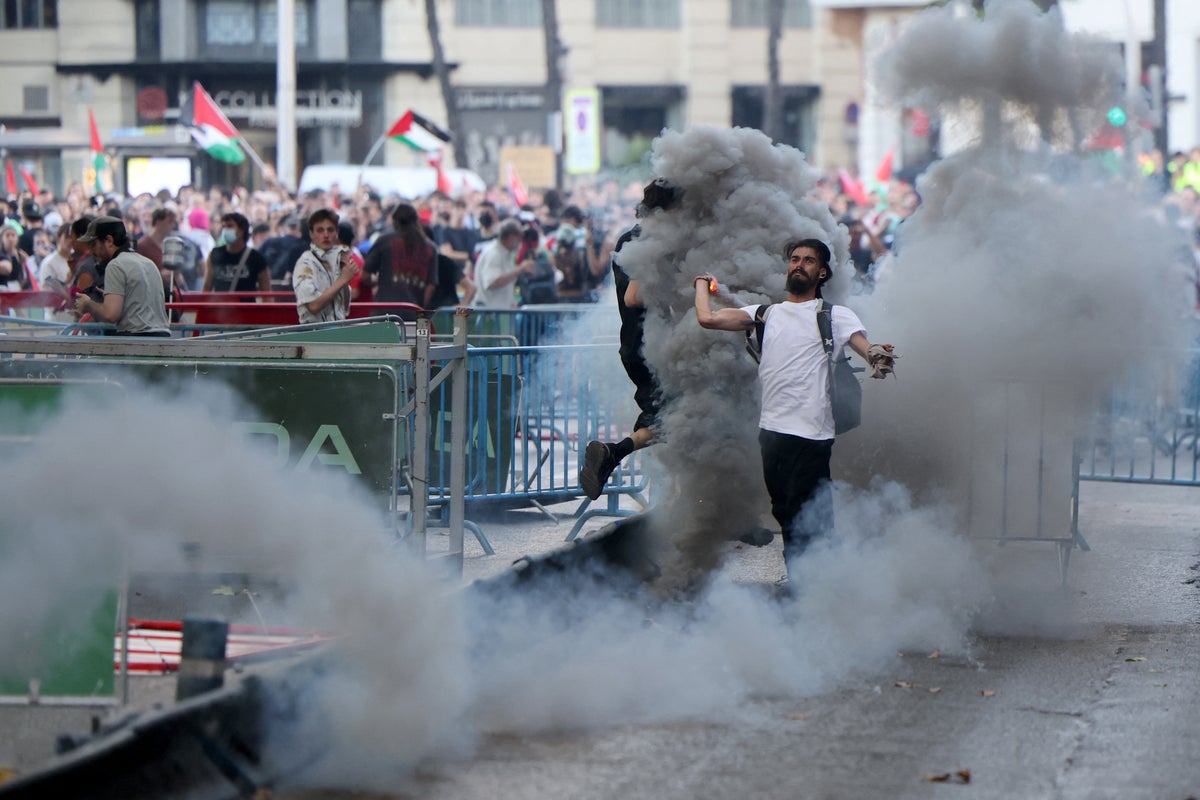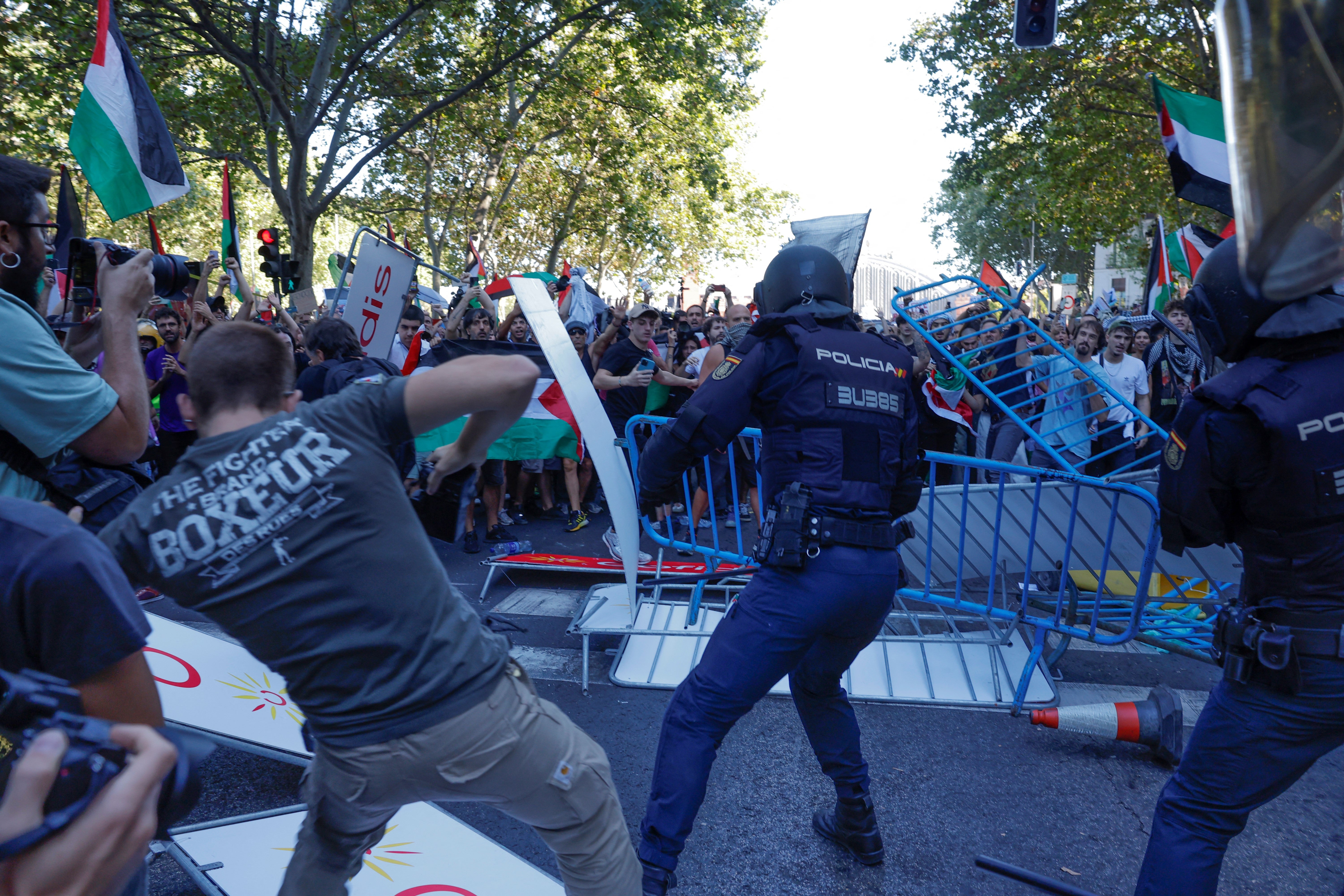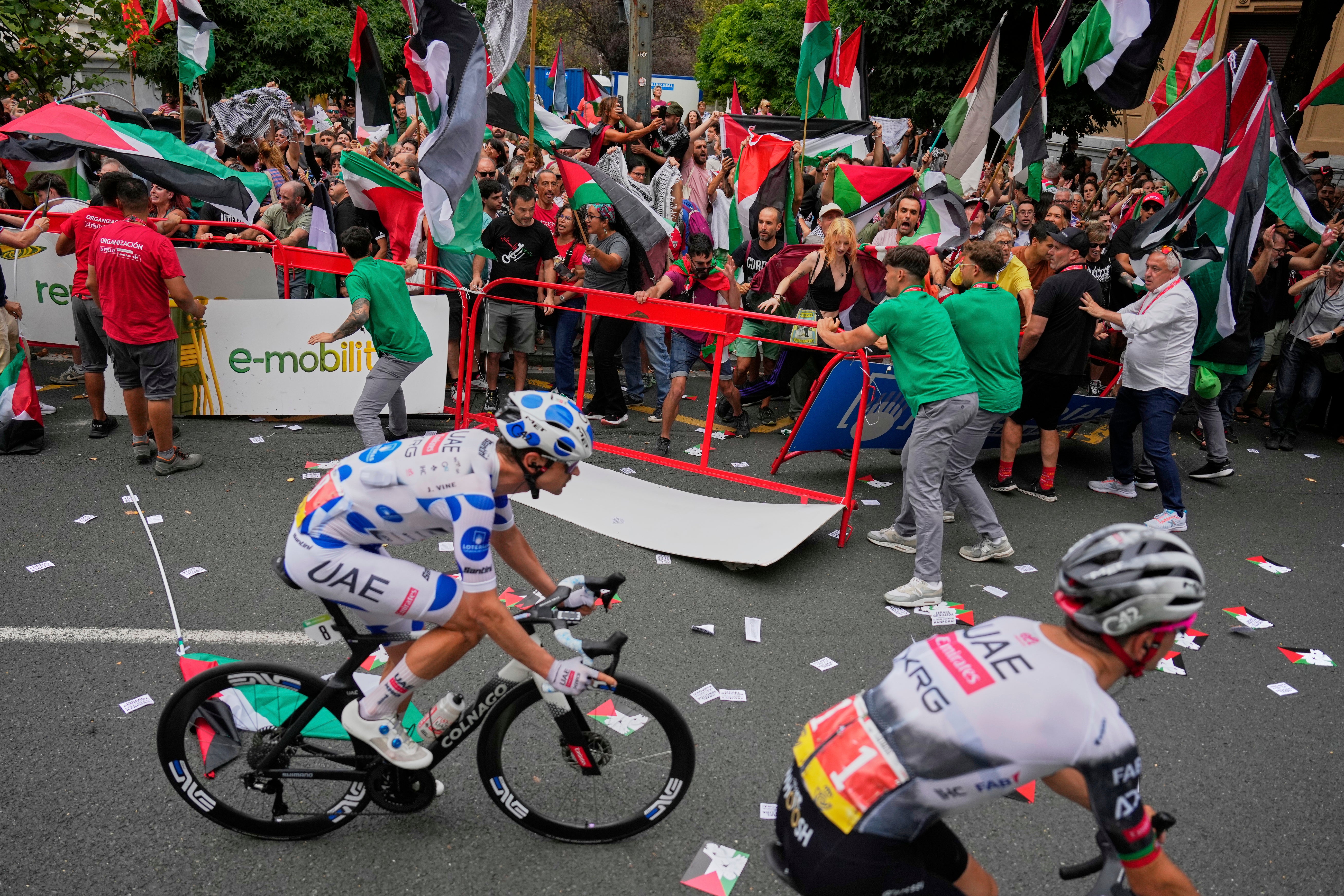
Ask any cycling fan in a few years’ time what they remember of the 2025 Vuelta a Espana and it’s unlikely to be the feats of Mads Pedersen, first man to win both Giro and Vuelta green jerseys in a year since Eddy Merckx in 1973; or Jonas Vingegaard’s first grand tour victory in two years; or Tom Pidcock’s brilliant fight for a maiden grand tour podium finish.
Instead, they’ll remember the pro-Palestine protests that essentially brought the race to its knees. Initial small-scale peaceful demonstrations, mostly targeted at the participation of team Israel Premier-Tech, spiralled as the race went on and the team refused to pull out.
IPT is owned by billionaire businessman Sylvan Adams, a Canadian-Israeli citizen and a self-appointed ambassador-at-large for Israel. He has invested significant amounts of money into promoting the country, notably bringing the start of the Giro d’Italia to Israel in 2018, and bills the team as a promotional vehicle for the nation – although the vast majority of its riders are foreign nationals.
The team’s participation has been a flashpoint for conflict at races all year, but this was different. Protests across Spain blocked roads, brought down riders, smashed through barriers and forced two stages to be cancelled and another two shortened considerably.
The whole race was ridden under a cloud, the riders not sure they’d make it to the finish line in Madrid, not sure what they were even competing for. Two riders crashed as a result of protesters spilling onto the roads; one, young Spaniard Javier Romo, withdrew the following day, mentally and physically bruised.
Thumbtacks thrown on the road meant the demonstrations crossed a hard line, an action that purely endangered the riders for no possible political gain – and added further jeopardy to a sport that is already dangerous enough.
Cycling is both sport and business, and it was the sporting side that was hardest hit in this race. Richard Plugge, Visma-Lease a Bike manager and one of the sport’s most influential voices, wrote on Sunday: “We must realize that sport is essentially about connection. It can build bridges and foster mutual understanding. But the participants must be protected: they cannot become victims of this debate.”
In the end the final stage was cut nearly in half by massive demonstrations in the Spanish capital, the riders bundled into cars to avoid further chaos, resulting in the pitiful scene of race winner Vingegaard looking mournfully out of the window at what might have been. They eventually celebrated with a makeshift podium ceremony in a car park by a team hotel. It was a sorry end to weeks of hard graft, months of preparation, the achievement of a lifetime totally overshadowed.

Sporting spectacle – or lack of – aside, this edition of the Vuelta is a watershed moment for cycling.
The principal problem is that now protests have so effectively disrupted one race, the signal is that this works. Cycling races operate in a fragile ecosystem, with security concerns balanced against accessibility for fans. The joy of bike racing is that it takes place in the real world rather than a sterile stadium, with fans inches from the riders, waving banners, cheering, feeling like part of the race. The atmosphere is unparalleled.
But from now on – especially given that the situation in Gaza shows no sign of abating – race organisers will have to put even more emphasis on security. The inevitable result will be a change in that famous atmosphere: more barriers, heightened checks, and possibly a move towards some sort of ticketed system, with limited access to certain areas. Closed-circuit city races, easier to police and easier to control, may become a more popular choice for organisers. It seems a logical step from there towards some kind of paid model, with entry and exit barriers to keep crowds under control.
But that of course nullifies the drama and excitement of a race, and erases its popular appeal. The traditional final stage of the Tour de France, on the Champs-Elysees, is brilliant as a sporting spectacle, but suffers from a lack of fans lining the roadside, bringing the race to life. That was illuminated most by this year’s revamped stage 21, through a Montmartre district positively thronging with cheering crowds. If that enthusiasm were dampened, hidden behind stronger fencing and lines of riot police like in Spain, it would do irreparable damage to the sport.

Protesting at races of course is nothing new – farmers’ protests are a regular quirk of the Tour de France – but the scale and ambition of those in Spain was magnified tenfold. It will not be confined to this one edition of the Vuelta. Activists’ groups have already stated they will target the start of next year’s Tour de France, in Barcelona. Amaury Sport Organisation (ASO), which runs the Tour, has buckets of cash and can take the Tour anywhere; it’s entirely possible it will see those statements and decide it will.
But if potential host towns and cities cannot guarantee the safety of riders passing through, or cannot afford the security detail, that will have a catastrophic effect on the sport too.
Races large and small will have a bigger burden to their organisation; don’t be surprised if more smaller-scale races shutter over the next few years under the weight, to add to the dwindling calendar in cycling’s heartlands. Sterile, depopulated races in countries with money to burn like the UAE and Saudi Arabia are becoming more and more entrenched in the calendar; if the long-term future of racing is there, that future may just be accelerated.
This is all a worst-case scenario. But it’s one cycling will have to think about.
There is a wider dimension to this. Cycling is home to unsavoury, reputation-laundering sponsors of all stripes and political persuasions, from petrochemicals giants to repressive Middle Eastern regimes. This Vuelta alone featured Ineos Grenadiers, Jayco-AlUla, UAE Team Emirates-XRG, Bahrain Victorious and XDS Astana, plus Groupama FDJ and Lotto, two teams run by national lotteries.

Few would argue that cycling isn’t overdue a reckoning, or at least some regulation, on the types of sponsors it allows. Perhaps these demonstrations will spark a wider conversation on the dark flow of money in cycling. But the increasing entrenchment of nation-state sponsors means that conversation is unlikely to be productive.
Aside from that, Israel Premier-Tech operates in something of a grey area: a team that has the name of a country emblazoned all over it, but not actually sponsored by that country. The fact remains that, for all its owner’s links to Israeli politics – and Benjamin Netanyahu’s tweet mid-race expressing support for “Israel’s cycling team” – legally, the team is a private entity, not connected to the state.
The Vuelta organisers had no legal grounds for booting them out of the race and no authorisation to, with the Union Cycliste Internationale (UCI) – cycling’s governing body – staying well clear. The UCI could in theory ban the Israeli-registered team, as it did to Russian and Belarusian teams after the invasion of Ukraine. It has not done so. Until it does, the Vuelta, and all other races, have their hands tied.
The nuances of cycling ownership were unlikely to cut through to the masses demonstrating across Spain, and Adams’ insistence on keeping the word ‘Israel’ front and centre has not helped matters, putting his own riders and team staff at risk. But no amount of protesting dislodged the team.
The final result was that the race and riders were caught in a dispute that could have no winners, and powerless to do much about it. It has been a dismal situation for everyone, and one that is likely to have consequences for the sport far beyond what anyone wanted.
Jonas Vingegaard seals redemption at Vuelta but problems persist for UAE without Tadej Pogacar
How the Vuelta a Espana transformed Tom Pidcock into a grand tour contender
‘We love you G’: How Cardiff delivered Geraint Thomas the ultimate farewell
More pro-Palestine protests cause cancellation of Vuelta finale as Vingegaard wins
Vingegaard seals redemption at Vuelta but problems persist for UAE without Pogacar
Noni Madueke delivers rivals a warning as Arsenal’s new-look front three clicks







